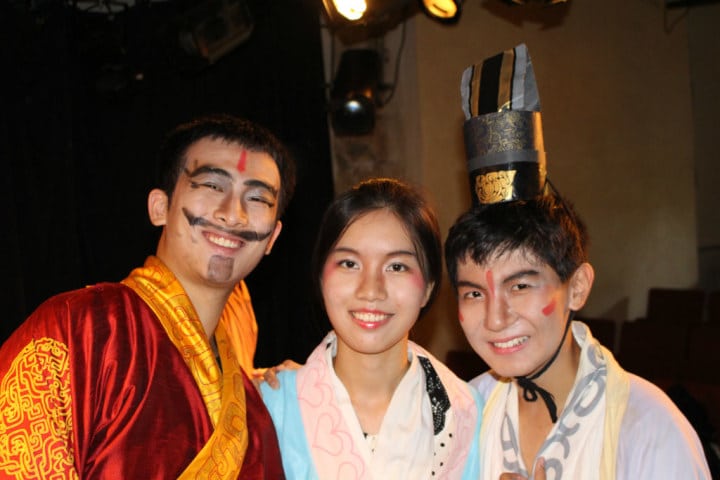The best place to taste the diversity of culture is International Arts Festival. This July, as a member of English drama team of our school, I was fortunate enough to attend Avignon Festival in France and was the protagonist in our English drama “Brotherhood Revenge”.
Avignon Festival features 80% local dramas and 20% international ones during the month. Ours, presented by Beijing No.4 High School English Drama Club in English, is categorized as one of the international ones. What is special about our team is that we are the first Chinese teenager drama team to attend this festival. It is a breakthrough for not only Chinese drama but also world drama.
Being the first means being the risk taker. As a green hand, we had no experience in how to make the best of it. We did everything by observing and learning. In terms of publicity, we did not realize how crucial it was until we found that every wall in the town was covered with all kinds of drama posters. The only things we had were several hundred pieces of leaflets. To make up for this, we dressed up in our costumes and played some traditional Chinese dramas right in front of the City Hall, where we can easily attract people. Culture shows, including Chinese calligraphy, Chinese painting, and paper cutting, were also parts of the “promotion plan”. During our presentation, we distributed our leaflets to those who were attracted to and interested in Chinese culture and drama, and invited them to watch our premiere.
It turned out that the plan really worked, because the attendance rate amongst the people whom we distributed leaflets to was way higher than the average attendance rate of the festival, which was only 1%.
Our premiere was a huge success. Everyone did the best he or she could. One of the characters played a role who suffered from injustice, and she was so into the play that she cried ceaselessly backstage, after her parts. To our pleasure, the show was lauded by both the audience and organizing committee, who promised to provide us with a larger stage next year.
However, it was not until after watching the dramas of Japan and Taiwan did we realize how to improve our drama. As most of the audience were French who did not know English very well, it occurred to the Japanese group performers that playing pantomime might be a good idea. So their drama combined comedy, acrobatics, action, and occasionally one or two French sentences together. Innovative stories and ideas were presented by exaggerated actions and eye contact. It turned out that their drama was on the list of “Most Popular Drama” in this festival. Likewise, the show presented by Taiwan team mainly used body language to convey. The props they used were nothing but several white drawers. At the same time people were appreciating the beauty of human bodies, they reflected over the relation between city and people. Later, when a French drama “The little Prince” which was mainly language-driven, I was bored to sleep because I could hardly understand what the actress was saying and doing even though I knew the story. Therefore, on this international stage when no one language is shared by all, I became much more aware of the importance of expressing myself verbally and non-verbally, as clearly and efficiently as possible.


